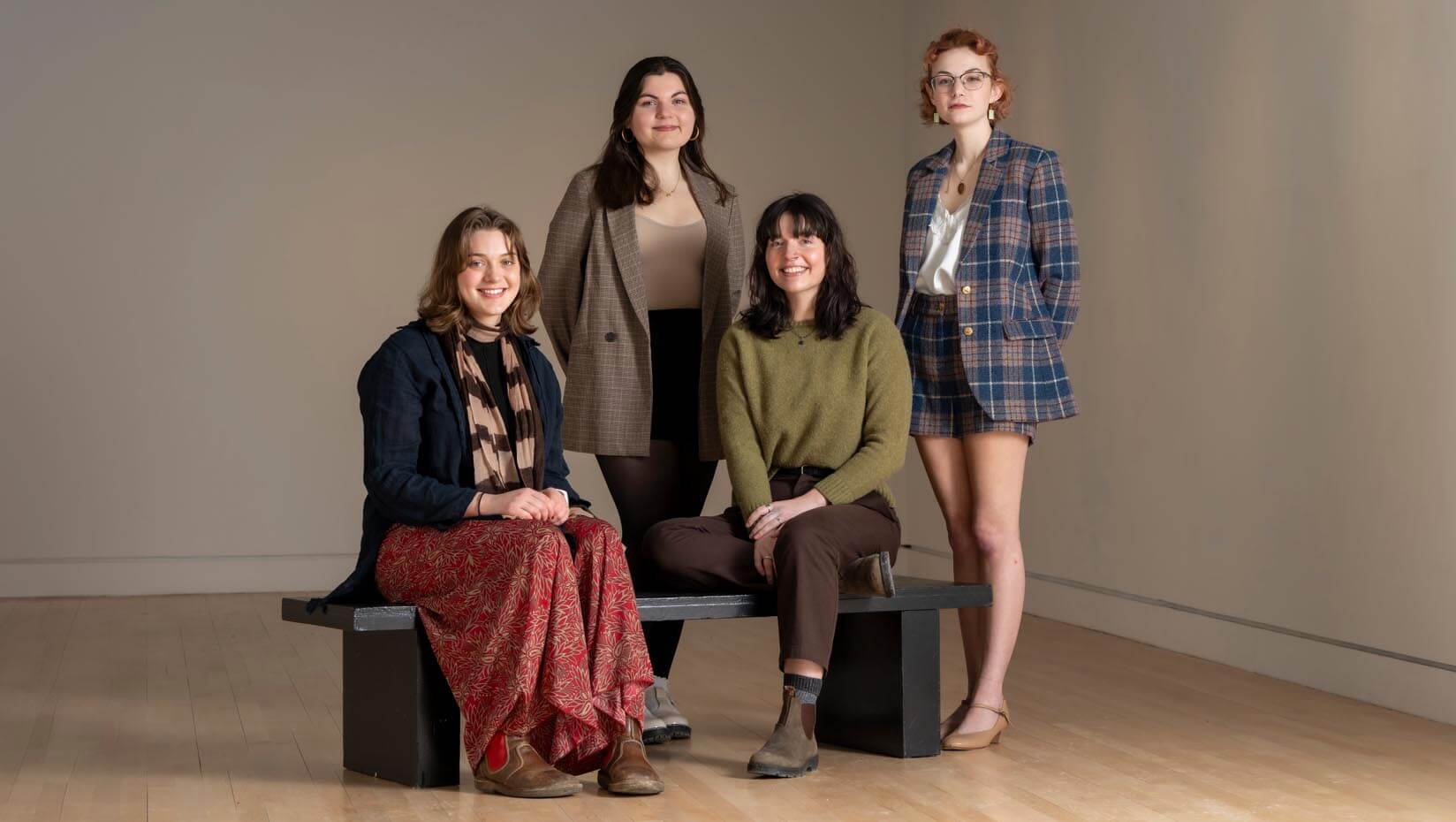
McGillicuddy Humanities Center welcomes newest cohort of undergraduate fellows
In spring 2024, the Clement and Linda McGillicuddy Humanities Center (MHC) will welcome four new undergraduate humanities research fellows: Kiera Campbell, Jess Cleary-Reuning, Alex Morgan and Mackenzie Reynolds. This new cohort will join current fellows Chapman “Chappy” Hall, Iris Loehr, Sarah Renee Ozlanski and Katherine Ritche.
MHC undergraduate fellows receive an award of up to $8,000 over the course of two semesters to pursue an independent research or creative project in the humanities in collaboration with a faculty member.
Campbell, a junior majoring in English from Buxton, Maine, was named the David ’64 and Alison ’71 Wiggin Humanities Fellow for her proposed research project “Getting To Know A Dead Man: The De-Deification of Brian (A Non-Case Study).” Kirsten Jacobson, associate professor in the Department of Philosophy, and Gregory Howard, associate professor of English, will supervise the study. Campbell’s project will draw on the work of philosopher Simone de Beauvoir to explore how the relationships children form with their parents change in young adulthood.
Cleary-Reuning, a senior in the Honors College from Eliot, Maine who is majoring in marine biology and minoring in journalism, will pursue a project titled “College Radio’s Continuing Role: How WMEB and Other College Radio Stations Create and Sustain Community,” supervised Michael Socolow, professor of communication and journalism. Drawing on her experience as manager of WMEB, UMaine’s student-run radio station, and her interest in media studies, Cleary-Reuning’s research aims to explore the recent history of WMEB in the context of the past and contemporary practices of college radio in the United States.
Morgan, a third-year psychology major in the Honors College with minors in philosophy and neuroscience from Perry, Maine, will pursue a project titled “Roots and Resilience: Understanding the Belonging Among Children of Iranian Diaspora in The United States.” Jordan LaBouff, associate professor of psychology and honors, will supervise the project. Morgan’s work will aim to understand how the underrepresented group of second-generation Iranian Americans experience their perceived belonging in a cross-cultural context of multiple identities.
Reynolds, the Liam Riordan Humanities Fellow and a history major and women’s, gender, and sexuality studies minor from Conroe, Texas, will be working on a project titled “Separate But Not Equal: The Exclusion of Black Women from First-Wave Feminism in Maine and Louisiana, 1900-1925.” Kara Peruccio, assistant professor of history and women’s, gender and sexuality studies, will supervise the project. By studying different modes of racism in Louisiana and Maine’s suffrage movements, Reynolds’s work will explore how social and cultural differences between Louisiana and Maine impacted the National American Woman Suffrage Association (NAWSA) and its auxiliaries in these states between the years of 1900–1925. Though NAWSA’s Maine and Louisiana Woman Suffrage Associations existed under the same national umbrella, their local politics and cultures impacted their statewide activism, who could be involved and how their platform was presented to each state’s respective citizens. Because of implicit and explicit racism found in their state movements, Black women in both states formed their own groups to advocate for themselves.
In addition to honing their research skills and building their academic networks, MHC fellows serve as humanities ambassadors to their peers, the campus and the broader community. For students interested in becoming a fellow, and faculty who might like to nominate one, the next deadline to apply is March 17. Research and creative work of all types across the humanities will be considered. This includes academic papers, art gallery shows, community workshops or films. Applicants do not need to be humanities majors or minors to be eligible. More information, including application instructions, proposal guidelines and a statement of purpose, is available on the MHC website.
The MHC supports excellent teaching, research and public engagement in the humanities to deepen understanding of the human condition. It elevates programs that foster intellectual curiosity, critical reflection and creative innovation. At the core of the center’s work is the belief that studying the humanities inspires compassion across differences, develops empathy, strengthens critical thinking skills and cultivates the emotional and intellectual agility needed to navigate an increasingly interconnected and complex global landscape.
Contact: Brian Jansen, brian.jansen@maine.edu
